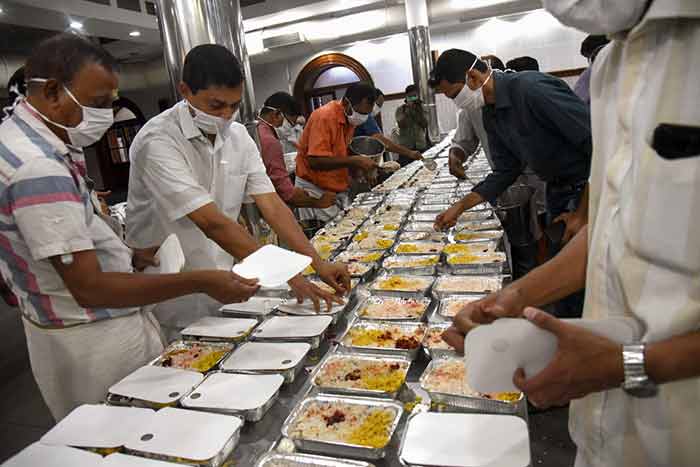
In as many as 13 states and Union Territories of India, Non-Government Organizations(NGOs) have fed more people than the government during the coronavirus induced lockdown. The data shows that in states like Kerala and Telangana with exclusive success stories, NGOs have played a huge role. States like Gujarat, Andhra Pradesh, Mizoram, and Maharashtra have seen a similar contribution of these non-profit, non-governmental organizations. NGOs have also sought to provide humanitarian aid like providing vehicles to migrants, students as well as workers to help them come home.
Civil society bodies are also providing shelter to the homeless, caring for elders, distributing safety gear, and running community kitchens. The Bihar NavnirmanYuvaAbhiyan had offered to pay the travel cost of 50 trains to carry migrants from Bihar and students stranded in Mumbai. Sphrooti Foundation of Hyderabad has distributed 7,500 safety kits to migrant workers in and around Hyderabad. Delhi based NGO Goonj has planned to provide livelihood support to 10,000 families in villages across the nation. Close to 55 NGOs and civil society groups have partnered with the government to supply cooked food and food rations in Bangalore alone. The Harela Society in Pithoragarh, Uttarakhand has invented a Purple Cube to protect its volunteers and workers from the infection when distributing food and doing relief work.This raises an important question – what is the role of civil society in times of crisis?
The role of the market and the state have always been greatly emphasised when talking about any crisis. The state is often considered to be at the forefront of any battle against an unexpected crisis such as the COVID-19 pandemic. All the debates around public health and economy have also kept the notion of the market alive. But the third domain of the public arena, the civil society has been silently playing its role. In a democracy, the role of civil societies has always been a highly important one – to build pressure on the state and keeping a check on governance. While the state has usually focussed on maximizing power, the market has been about maximizing profit. The civil society has mostly sought neither power nor profit.
The market is embedded in society, as Karl Polanyi had arguedand one cannot exist without the other. As such, there needs to be a third party. Environmental crisis has been unprecedented, global climate change is undeniable, despite many states claiming them to be false. Global inequality and poverty are ever-increasing, as many Indians have lost their jobs in the recent crisis. The Centre for Mentoring Indian Economy (CMIE) reports that over 122 million people in India lost their jobs in April alone.The unemployment rate in India has increased from 8.74% in March to 23.52% in April, a massive rise. There needs to be another dimension, a benevolent one, one which goes beyond power and profit.
The World Economic Forum has defined civil society as the area outside the family, market, and state. Civil society occupies an important position in the development dialogue as it provides opportunities to bring communities together for collective action, mobilization of society, and voices concerns at local, national, regional, and international levels. The creation of civil society can thus, be seen as an achievement of modern society.
Between 2014 and 2020, over 14,500 NGOs got their licenses cancelled because they received f funds from abroad under the Foreign Contributions Regulatory Act (FCRA). Surprisingly, the NITI Aayog has now requested that more than 92,000 NGOs help the state fight the pandemic. This is a welcome move, but the suspicion and skepticism about the civil society bodies have not made this battle any easy. The eligibility criteria for receiving foreign funds have also been amended. The new rule states thatall office-bearers and members of an NGO need to declare that they have not been prosecuted or convicted for converting anyone from one faith to another or for creating communal tension or disharmony. Each of these officials must also declare that they are not engaged or likely to engage in ‘propagating sedition’ or diverting foreign funds for undesirable purposes or personal gains. Certificates of registration of 1,808 FCRA registered NGOs have been cancelled in 2019 for non-submission of mandatory annual returns for 2017-18.
The utter distrust of civil society bodies has been a matter of concern. It is understandable that the state needs civil society in the times of this crisis. But it is only fair that we understand that the role of these civil society bodies goes far beyond a pandemic induced crisis -NGOs have always continued struggled and brought relief to the poor and the needed.
Ritwika Patgiri is a PhD Research Scholar, Faculty of Economics South Asian University, New Delhi
SIGN UP FOR COUNTERCURRENTS DAILY NEWS LETTER









































